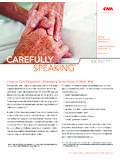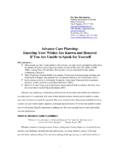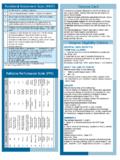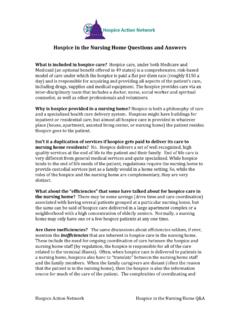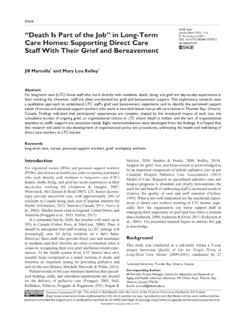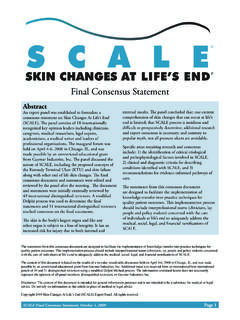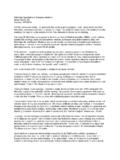Transcription of A Caregiver’s Guide to Advanced Dementia
1 A Caregiver s Guide to Advanced Dementia Compassionate Evidenced-based care for the End-stage Demented Patient Prepared by Daniel R Hoefer MD CMO Outpatient Palliative care and Hospice A CAREGIVER S Guide TO Advanced Dementia Compassionate Evidenced-based care for the End-stage Demented Patient TABLE OF CONTENTS Description Page Foreword .. 1 Introduction .. 2 Definition .. 3 Dementia Has Many Faces .. 5 Areas of Caregiver Concern .. 7 Understanding the Difference between Custodial Home Health Aide care and Home Health Nursing.
2 9 Be Prepared .. 10 In Home Support Services (IHSS) .. 11 End-of-Life Issues .. 12 Resuscitation/Code Status .. 13 Nutrition Feeding Tubes .. 15 Hydration .. 18 Terminal Delirium .. 19 End of Life Observations .. 20 Other Considerations .. 21 Hospitalization Results .. 23 Future Health care Tenants .. 27 Do Not Transfer to Hospital .. 29 Prognostication with Dementia .. 31 Hospice care .. 32 Prologue .. 33 Phone Numbers for Reference .. 34 Functional Assessment Staging Scale (FASS) .. 35 Palliative Performance Scale (adapted Karnofsky) .. 36 Self- care Guidelines, Caregiving .. 37 Citations .. 44 Citations Delirium 2009 .. 55 Index .. 57 A CAREGIVER S Guide TO Advanced Dementia Compassionate Evidenced-based care for the End-stage Demented Patient Prepared by Daniel R.
3 Hoefer MD, 2009 Page 1 Foreword The first question I need to ask the reader is, How much do you want to know? I ask this question with great sincerity as medical evidence and personal experience show that some patients and caregivers do not want to hear the whole story. The truth, for these people, is too emotional and they might prefer to not read what I am about to write. If you are one of them, please return this Guide to whoever gave it to you and defer the discussion of the care for your loved one to your doctor or perhaps a different family member or friend. For the rest of you, please read on.
4 Caring for an end-stage demented loved one is an emotional, physical and financial challenge. The burdens of this experience can leave a caregiver feeling overwhelmed with issues of guilt, doubt and isolation. It is so overwhelming that 72% of caregivers report feeling relieved when their loved one finally dies. The problem is that many of the decisions surrounding the care of the demented are a choice between two, or more, difficult pathways. Furthermore, guidance from the healthcare industry has been weak. The time and expense in managing these patients can also be immense. This Guide cannot remove all of the difficulty in caring for your demented loved one but will hopefully make it easier to understand and prepare for the inevitable changes you will see in your family member or experience yourself.
5 As well, it may help you to avoid making decisions that are counterproductive and even harmful. I would offer you some of the best advice ever given to me by one of my patient s caregivers who was involved in the care of her second demented loved one. I simply asked her how it was that she handled the stress of her caregiver role so well. Her response Any time something catastrophic happens I just deal with it and get over it as fast as possible, because something new and catastrophic is right around the corner. A CAREGIVER S Guide TO Advanced Dementia Compassionate Evidenced-based care for the End-stage Demented Patient Prepared by Daniel R.
6 Hoefer MD, 2009 Page 2 Introduction The estimated number of Americans currently with Dementia is million. By 2050 it will be million. The reasons for the increase in Dementia have to do with our aging population, decreased death rates (mortality rates) from other diseases and an increased awareness that Dementia is a deadly disease. The probability of developing Dementia is 19% between the ages of 75-84. Over the age of 85, the probability is 30-50%. These are the fastest growing segments of our population. This is partly due to the fact that diseases such as cancer and heart disease are either being cured or managed with much greater efficiency such that patients are dying from other causes.
7 Adding to the increased awareness of Dementia is that healthcare providers are starting to acknowledge the aggressive and deadly nature of this disease. Historically this has not been the case. In a study looking at demented patients admitted to nursing homes in New York State between 1994 and 1997, of 1609 patients studied, only of physicians provided evidence or documentation that they knew the patient was terminal. Seventy-one percent (71%) died within 6 months. It should not be surprising then that historically Dementia has been under reported on death certificates. Physicians, for example might report that a patient died of respiratory failure from pneumonia.
8 However, it was Dementia that precipitated the respiratory failure. Life expectancy in Dementia is reported on average between 5 to years. These numbers are probably overestimates when we account for rapidly progressive disease. Regardless, caregivers should be aware that the range of life expectancy is 1 to about 15 years. caregivers should prepare that they may be in for a rapid or very long process. A CAREGIVER S Guide TO Advanced Dementia Compassionate Evidenced-based care for the End-stage Demented Patient Prepared by Daniel R. Hoefer MD, 2009 Page 3 Definition So what is Dementia ? A simple definition of Dementia would be a decline in mental function that interferes with a person s memory and ability to interact normally.
9 The technical definition of Dementia is the following both are required. A) A decline in two of the following four categories a. Memory b. Ability to generate coherent speech and understand written and spoken language c. Capacity to plan, make sound judgments and carry out complex tasks d. Ability to process and interpret visual information B) Decline must be severe enough to interfere with day to day life These definitions are unfortunate however, because it is clear that Dementia also involves physical and physiologic deterioration. There are several types of Dementia . Alzheimer s Dementia is the most common. Dementia is rarely reversible and a physician can easily do a work-up to determine if that is the case.
10 Sometimes but not always, it is important to know what type of Dementia your loved one has, as this could effect treatment and prognosis. It should be recognized however, that Dementia , when not reversible, is a uniformly fatal disease. It is unfortunate that healthcare providers frequently refer to medical treatments as curative care . care provided to any patient with a chronic medical condition is rarely curative. Medical research has shown that 27% of patients die believing the healthcare industry failed them because their condition should have been cured even when it was an incurable disease. Dementia is an incurable disease.
